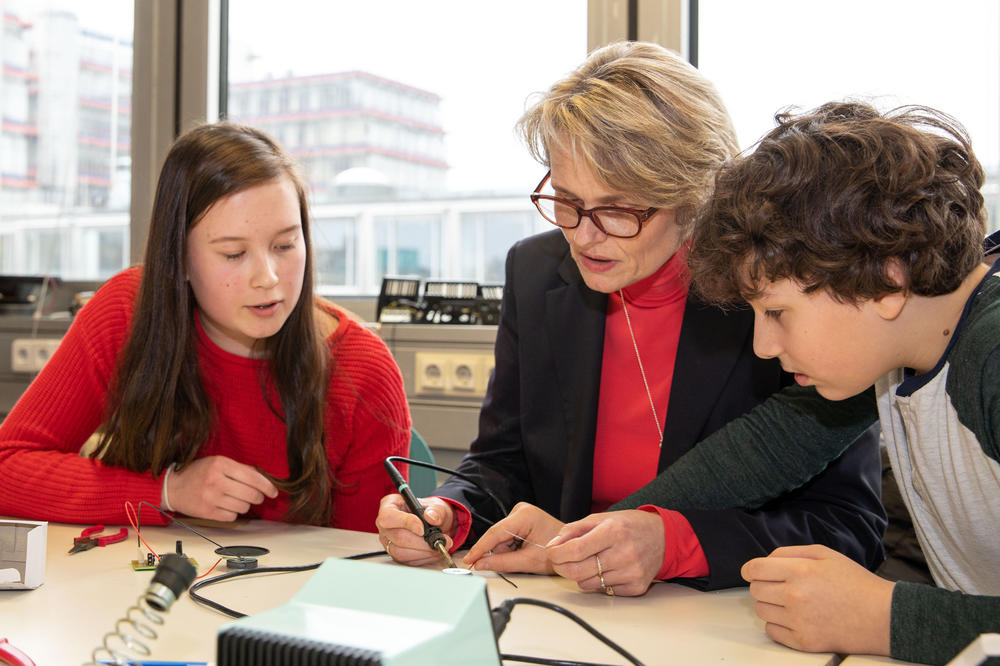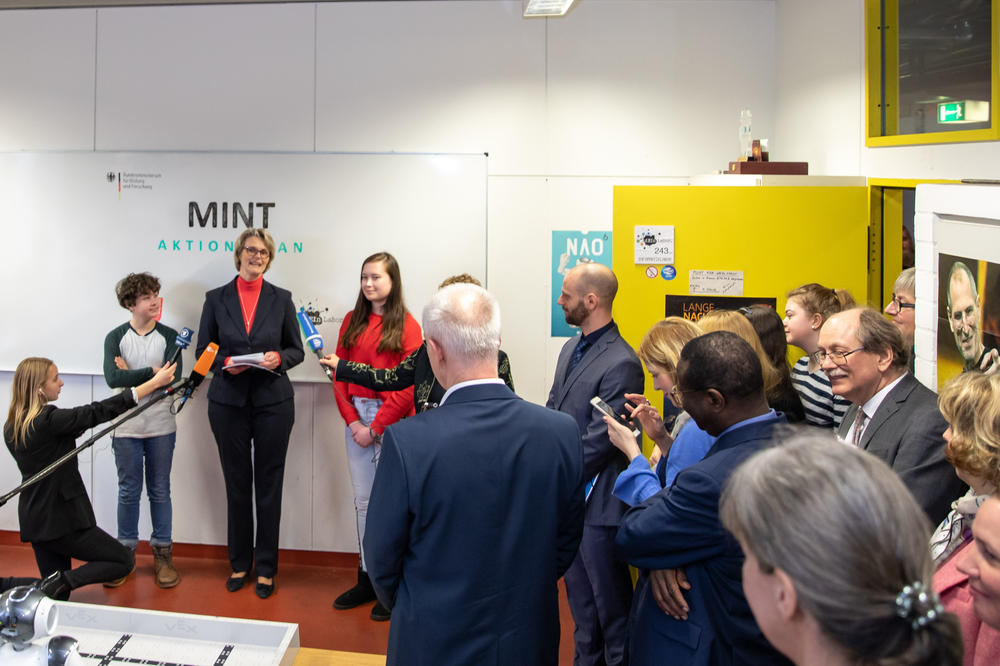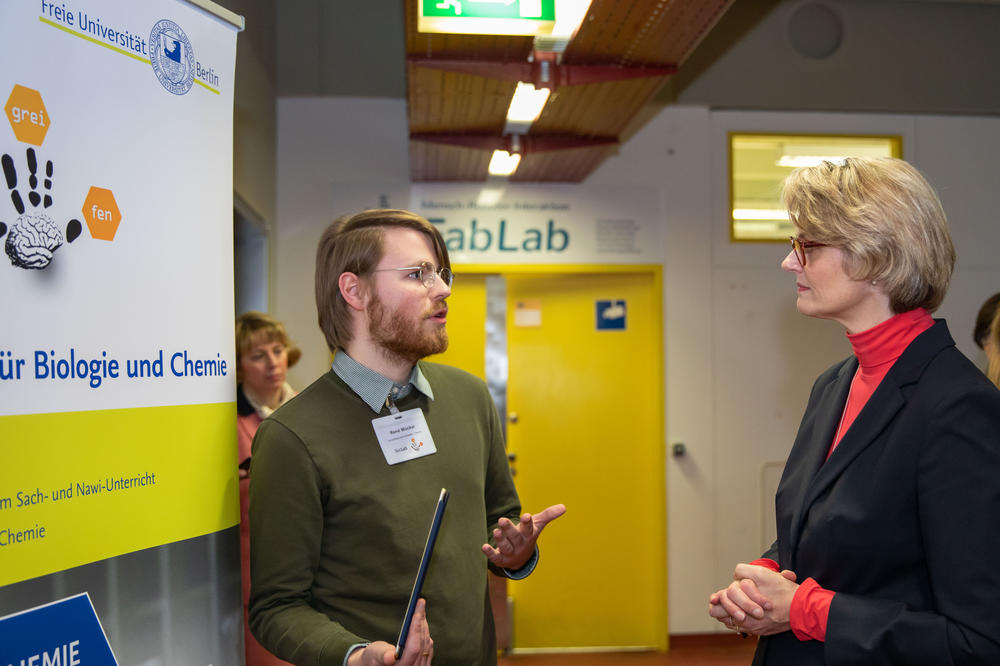The Minister Learns to Solder
German Federal Minister of Education and Research Anja Karliczek paid a visit to the dEIn learning laboratory at Technische Universität Berlin. It belongs to GenaU, a network of 16 learning labs in Berlin.
Mar 19, 2019
Guided by two eighth-graders: German Federal Education Minister Anja Karliczek in the dEIn school lab.
Image Credit: Felix Noak
Karliczek is sitting at a lab desk and soldering. It is the first time the MBA graduate has done this, but two eighth grade students are giving advice. One says, “The red cable now has to be soldered onto the switch.” “Like this?” asks the Minister.
She is visiting the dEIn learning lab at Technische Universität to present the MINT action plan devised by the German Federal Ministry of Education and Research. The Ministry is set to spend an extra 55 million euros on the MINT project in schools and colleges. MINT stands for Mathematics, Informatics, Natural science, and Technology. And learning labs in Berlin will also benefit from the Action Plan.
Education Minister Anja Karliczek’s presentation of the Ministry’s MINT Action Plan to the student laboratory at Technische Universität also attracted interest from the media.
Image Credit: Felix Noak
The dEIn lab – E for electronics, I for informatics – engages pupils from 5th to 13th grades in building humidity sensors for flower pots or programming apps or robots – one such has been dubbed Naomi. Karliczek greets “her” in another room with “Hello, how are you?” Claudia Ermel, head of the dEIn laboratory, says, “Construction set robots are very popular with the children. Sometimes they have to be reminded at the end of the day that they are not allowed to take the robots home with them.”
There are workshops in the learning lab three to four times a week. In the past year, a total of 2800 pupils have explored and constructed things. “Our lab is the only computer science lab in Berlin. But we are in close cooperation with other labs in the GenaU network,” says Ermel. “Construction set robots are very popular with the children.”
The GenaU network has been in operation since 2006. Participants include 16 learning labs at the three main Berlin universities and research institutions (the Museum für Naturkunde and the GFZ German Research Centre for Geosciences) as well as eight associated partners.
The aim of the learning labs is to encourage interest in MINT subjects and to allow students to experiment and experience research at first hand. GenaU is coordinated by Silke Vorst at Freie Universität. She is a graduate in biology, works in the fields of biology, chemistry, and pharmaceutics and represents the network externally. She is its spokesperson and contact in the Berlin Senate Department of Education, Youth, and the Family, which subsidizes the network. The heads of member labs and partners meet at least three times a year, and there are internal continuing professional development courses on themes such as inclusion and education for sustainable development.
Every year, over 50,000 students attend the experimental network courses.
The linking to the association is a bonus for everyone, says Vorst. Those that are already established will help the new ones. Labs with permanent premises can afford to think longer term; they might connect with less secure labs that lack continuity because of a high turnover of occupants more quickly to the MINT scene. Established labs should not, however, be afraid of competition, as “There is enough interest from school groups; learning labs are fully booked.”
Every year, over 50,000 students attend the experimental network courses. In Berlin there are roughly 300,000 students – “learning labs are generally working at full capacity – we would like to reach more children and young people, but we lack the additional space,” says Vorst. Furthermore, around 1,000 teaching staff and 500 student teachers receive training in the learning labs. The high demand is in Vorst’s opinion a good sign. Both students and teachers are overwhelmingly positive in their feedback. Only once was there a problem: “Pupils were reluctant to return to normal lessons after the visit.”
Teaching student René Muckai explains to Minister Karliczek the digital teaching and learning concept he developed that school classes can use to prepare their student lab visits.
Image Credit: Felix Noak
How might schools be more closely interconnected with research? René Mückai is looking into this question. The biology and chemistry graduate is studying for a teacher training qualification and is completing a master’s degree at Freie Universität in the NatLab learning lab. He is working on a digital learning and teaching concept that aims to prepare lab visits and relieve the teaching element in them. He shows Karliczek how pupils can replicate the research process using his digital “book” on the interactive teaching and learning platform tet.folio. The individual research steps of observing natural phenomena, developing a question, planning the investigation, etc. can be arranged on tablets in the correct sequence using a finger to move them around the screen.
“In student teaching, too, we use digital elements such as online quizzes and learning videos. We set out to provide an example: student teachers will learn how best to use digitalization in seminars so that later they can make appropriate use of these resources in their classes.”
In April, Mückai will tackle his dissertation and pursue the question of how digital preparation and follow-up of a learning lab visit can help promote a scientific way of thinking. His research results will stand all the partners of the GenaU project in good stead. If more boys and girls in Berlin opt for a career in engineering, software development, or natural science, then Karliczek’s Action Plan will have been a success.
Further Information
The GenaU network is an association of 16 learning labs at research institutions and universities in Berlin and Brandenburg. In the network’s labs, pupils can work on independent experiments. The goal is to enthuse young people for the natural and engineering sciences and to create new dynamics in the classroom. The experimental courses are supplemented by additional working groups and teacher training courses.
The fact that labs are located at research institutions, universities, and museums allows pupils to gain practical experience of authentic workplaces.



